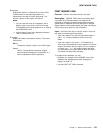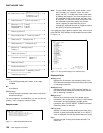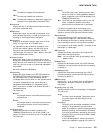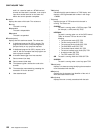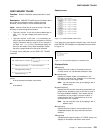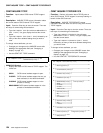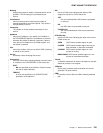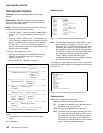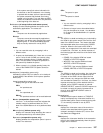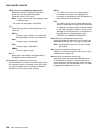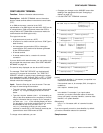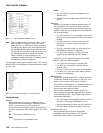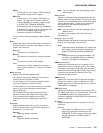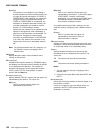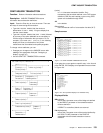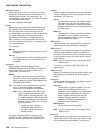CEMT INQUIRE TDQUEUE
If the system cannot find volume information for
the data set on the DD statement, in the catalog,
or passed with the data set from a previous step,
the system assumes that the data set is being
created in this job step. For a new data set, MOD
causes the read/write mechanism to be positioned
at the beginning of the data set.
Enablestatus (all except indirect and remote queues)
displays a value indicating whether the queue can be
accessed by applications. The values are:
ENabled
The queue can be accessed by applications.
DIsabled
The queue cannot be accessed by applications,
although it can still be open. Queues with names
beginning with “C” cannot be disabled because
they are usually reserved for use by CICS.
Notes:
1. You can reset this value by overtyping it with a
different value.
2. A queue can be disabled only if there are no current
users. If units of work (UOWs) are currently using
the queue, the queue enters a “disable pending”
state. The last UOW to complete its operation on
the queue fully disables the queue.
3. When a queue is in a “disable pending” state, the
value of the ENABLESTATUS option cannot be
altered.
Indoubt(
value) (intrapartition queues only
)
indicates the action CICS is to take for an in-doubt unit
of work (UOW) if the definition for this queue specifies
WAIT(YES).
Iotype (
extrapartition queues only
)
displays the type of data set to be used:
INPut
An input data set.
OUtput
An output data set.
RDback
An input data set that is to be read backward.
| Member (extrapartition queues only)
| returns a 1- to 8-character name that indicates the
| member name of a partitioned data set. This is
| blank if the QSAM data set is not a partitioned data
| set.
NAmeind(
value
) (indirect queues only)
displays a 4-character string identifying the name of
the queue pointed to by the indirect queue.
Openstatus (extrapartition queues only)
displays whether the extrapartition queue is open or
closed. The values are:
OPen
The queue is open.
Closed
The queue is closed.
Notes:
1. You can reset this value by overtyping it with a
different value.
2. Queues no longer have to be enabled before
they can be opened or closed. It is advisable
for a queue to be disabled before it is opened
or closed.
Queue
The UOW is in-doubt and waiting; any locks held by
the UOW for this queue remain active until the final
state of the UOW is known. This means that tasks
are suspended rather than receiving the LOCKED
response. When the final state of the UOW is
known, any changes that it has made are committed
or backed out. Until then, any further requests of
the following types that need one of the active locks
must wait:
READQ, if the indoubt UOW has issued
READQ or DELETEQ requests
WRITEQ, if the indoubt UOW has issued
WRITEQ or DELETEQ requests
DELETEQ, if the indoubt UOW has issued
READQ, WRITEQ or DELETEQ requests.
REJect
The UOW is in-doubt and is waiting. Any locks held
by the UOW for this queue are retained until the
final state of the UOW is known. When the final
state is known, any changes the UOW has made
are committed or backed out. Until then, any further
requests that need one of the retained locks are
rejected, and a LOCKED response is returned.
INDOUBT=REJECT causes a LOCKED response to
be raised in exactly the same circumstances as
those in which INDOUBT=QUEUE causes a
transaction to wait.
Tdqueue(
value
)
indicates that this panel relates to a TDQUEUE
inquiry and displays the 4-character identifier of a
transient data queue. Queue names beginning with
“C” are normally reserved for use by CICS.
TErmid(
value
)
displays the 4-character name of the terminal or
session to be associated with this queue when
automatic transaction initiation (ATI) occurs. See
also Tranid and Triggerlevel.
TRAnid(
value
)
displays the 4-character identifier of the transaction
that is to be initiated automatically when the queue
trigger level is reached.
Chapter 11. Master terminal CEMT 127



